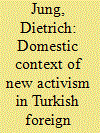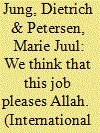| Srl | Item |
| 1 |
ID:
050230


|
|
|
|
|
| Publication |
London, Routledge, 2004.
|
| Description |
vii, 255p.
|
| Standard Number |
0415324106
|
|
|
|
|
|
|
|
|
|
|
|
Copies: C:1/I:0,R:0,Q:0
Circulation
| Accession# | Call# | Current Location | Status | Policy | Location |
| 047563 | 327.172/GUZ 047563 | Main | On Shelf | General | |
|
|
|
|
| 2 |
ID:
121174


|
|
|
|
|
| Publication |
2012.
|
| Summary/Abstract |
The novelty of Turkish foreign policy is currently on everybody's lips.
With catchwords such as "soft power," "activism," or the assumption of a
new "eastern orientation," media pundits and scholars alike discuss the
transformation of Ankara's neighbourhood policy for which the minister of
foreign affairs, Ahmet Davutoglu, has coined the slogan of "zero-problem
policy" with Turkey's neighbours. There is no doubt that in comparison
with the rather hands-off approach toward the Middle East that was a core
element of the foreign policies of Turkey's Kemalist political elite, under
Prime Minister Recep Tayyip Erdogan the country has made its immediate
and more distant neighbourhood a field of foreign policy activism.
|
|
|
|
|
|
|
|
|
|
|
|
|
|
|
|
| 3 |
ID:
131562


|
|
|
|
|
| Publication |
2014.
|
| Summary/Abstract |
This article explores the role of Islam in contemporary Jordanian charities and social welfare organizations. In what ways do these organizations relate to Islamic traditions in their work? What role do religious convictions play in the construction of modern selfhoods among their employees and volunteers? Do these constructions relate to broader, globally relevant, social imaginaries? The article tries to answer these questions by applying a novel analytical framework to qualitative data from fieldwork conducted among Jordanian charities and social welfare organizations. We treat these organizations as "social sites" for the reinterpretation of Islamic traditions in the context of global modernity as well as for the construction of meaningful forms of modern selfhoods among their members. In doing so, we argue that these specifically Islamic identity constructions can fruitfully be understood with reference to different types of globally relevant social imaginaries.
|
|
|
|
|
|
|
|
|
|
|
|
|
|
|
|